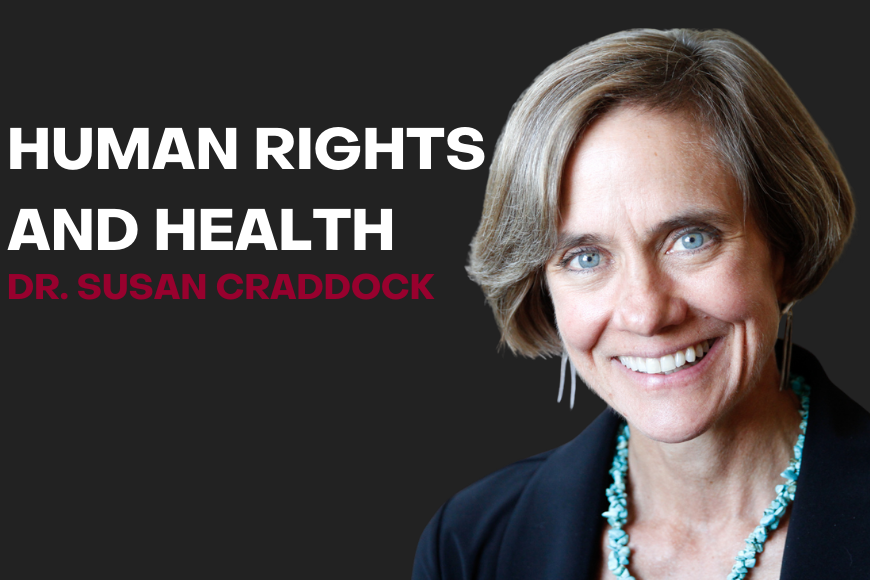Human Rights and Health in Clinical Trials
Human rights research and teaching at the University of Minnesota spans multiple Schools and Colleges including liberal arts, public policy, law, public health, education, design, and medicine, among others. This three-part series highlights the work of our faculty specializing in health care.
Dr. Susan Craddock’s research and teaching focuses on the ethics of clinical trials in the development of pharmaceuticals, contributing to important dialogue on the relationship between human rights and medical advancements. Learn more about Susan Craddock, her work, and the ways in which she sees the right to medical advancement as a contribution to social justice and the sphere of human rights below.
Tuberculosis is a disease which is largely concentrated in low-income countries around the world and currently undermines the health and wellbeing of approximately 10 million people. Affecting populations in India, China, the Philippines, Pakistan, Nigeria, Bangladesh and South Africa, TB is identified as being a health security threat. As the right to health is cemented into international human rights law, the United Nations has made the end of this epidemic a large component of the UN’s 2030 Sustainable Development Goals. The development of vaccines and effective treatments is central to the achievement of this goal and one whose realization involves many ethical dilemmas. Dr. Susan Craddock, through her studies on Product Development Partnerships and the development of TB vaccines, plays an important role in contributing to the conversation connecting public health to human rights in the international sphere.
Since becoming a member of the University of Minnesota Faculty in 2001, Dr. Susan Craddock has devoted herself to investigating patterns of infectious diseases and the responses to them. She describes her work, specifically, as focusing on the “social and political aspects of global health, and particularly on infectious diseases.” Over the years, Dr. Craddock has worked on “determining variable patterns of vulnerability to particular infectious diseases… investigating the human rights issue of access to medicines… and looking at the ethics of certain kinds of clinical trials and vaccine access.” Central to such work is the investigation of the ways in which interests-- corporate, political and scientific-- influence different communities’ access to and experience with diseases.
While Dr. Craddock does explicitly focus on human rights in her work she acknowledges that, “even if I don’t use human rights frameworks, they’re always there.” She also investigates the power of human rights discourse in changing the popular understanding of healthcare. She describes her work as being “always about social justice” and sees questions of access to essential medicines as being deeply connected to questions of human rights. She notes, specifically, that in the AIDS epidemic, access to drugs “became a human rights issue” and investigates what it meant to call such a situation a human rights issue.
In her most recent book, Compound Solutions: Pharmaceutical Alternatives for Global Health, Dr. Craddock investigates the ethics of the development of the tuberculosis vaccine in developing countries. She explores the use of Product Development Partnerships, 21st-century nonprofit organizational structures that facilitate the funding for the development of drugs, vaccines, and other health tools as public goods. While such organizations are not driven by the same incentives as large pharmaceutical companies in the development of vaccines, they do confront a host of ethical dilemmas because of contexts of global inequality. These dilemmas include language barriers to informed consent for clinical trial participants and the difficulties of obtaining the kinds of data that will be considered rigorous enough to attain approval (from the FDA e.g.) of a new product while not directly addressing the poverty leading to high rates of TB.
ethical or always fulfilling human rights
because once you get into the background
of ‘why are people in this particular area so
riddled with ‘x’?’, then you get into a lot of areas
that can be human rights abuses."
Dr. Craddock, in her research, keeps central questions of global inequality and power, insisting that a complete analysis of the ethics of vaccine development must take into account and question the reasons for which such diseases continue to be an issue in low-income regions of the world. Given that many low-income areas are affected by infectious diseases and are thus sites of research in clinical trials, Dr. Craddock points out that it is “hard to think of a clinical trial as always ethical or always fulfilling human rights because once you get into the background of ‘why are people in this particular area so riddled with ‘x’?’, then you get into a lot of areas that are typically called human rights abuses. Whether it’s brutal colonialism, long, drawn-out negligence… [there exist] extreme inequalities that determine that some people, and not others, are going to be at risk for [infectious diseases]”. Such a perspective has been developed and informed by her work studying the emergence and international response to the H1N1 pandemic, to clinical trials conducted on the development of tuberculosis vaccines, and by her examination of the politics shaping the AIDS pandemic.
Such attention to questions of international inequality and social justice, as they relate to patterns of infectious diseases and the responses to them, made Dr. Craddock a unique and important contributor to the Conference on Stigma, Health, and Human Rights at the University of Minnesota in 2017. Dr. Craddock looks forward to participation in similar events in the future and contributing to advocacy work done in the area of human rights through the sharing of her knowledge, both in conferences and publications.
Dr. Craddock’s analysis of patterns of diseases and the responses to these diseases globally provide her with a unique insight into the manifestation and management of the COVID-19 pandemic. Unfortunately, she sees the response to the pandemic and the development and distribution of the vaccine as reproducing historic inequalities. “The bottom line is that nothing ever really seems to change, and that’s disheartening… The only difference is that there was more activism among organizations” to enact a more equitable distribution of the vaccine. Those wealthy countries of the Global North, with their wealth and power, “line up beforehand and buy up” and control a large portion of the available vaccines, leaving lower-income countries to take what is left over; a pattern manifested in the H1N1 pandemic.
Dr. Susan Craddock passes her knowledge and critical insight to students at the University of Minnesota through courses in the department of Global Studies, focusing on numerous facets of national and global economics, politics, and practice, while , facilitating the formation of critical thinkers attuned to the injustices in the global management of diseases.



